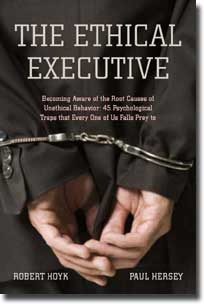Between the winter of 2001 and the summer of 2002, Enron and Adelphia Communications filed for bankruptcy, and Tyco International was accused of evading sales tax totaling $1 million. Recently, the CEO of WorldCom was convicted in a federal court of an $11 billion dollar accounting fraud. Was this an unfortunate saga in corporate history or were the leaders of these companies unusually corrupt?
The disconcerting answer to that question, say Bob Hoyk and Paul Hersey in The Ethical Executive, is "No, these leaders are probably little different from us." Like us, they live in a world where there are always multiple causes for our actions. Our behavior is the result of a complex weave of situational factors, history and personality. Even if we have good ethical values to begin with, given certain situational pressures, we can all become unethical.
In this book, Hoyk and Hersey describe 45 "unethical traps" into which any one of us can fall. These traps, they say, can erupt in any organization environment. Some of these traps distort our perception of right and wrong—so we actually believe our unethical behavior is right. Many of them are psychological in nature, and if we're not aware of them they are like illusions—webs of deception. In their analysis, these traps significantly contributed to the large-scale corporate disasters we witnessed in recent years.
The authors take account of these realities, and offer a "real-world" method that will predict, preclude and, if necessary, "get us out of" these traps. Given the increased scrutiny under which all executives and mangers operate today, this book is a 'must read' for anyone who is charged with achieving an organization's mission – whether that mission is increasing profit, serving the common good, or both.

